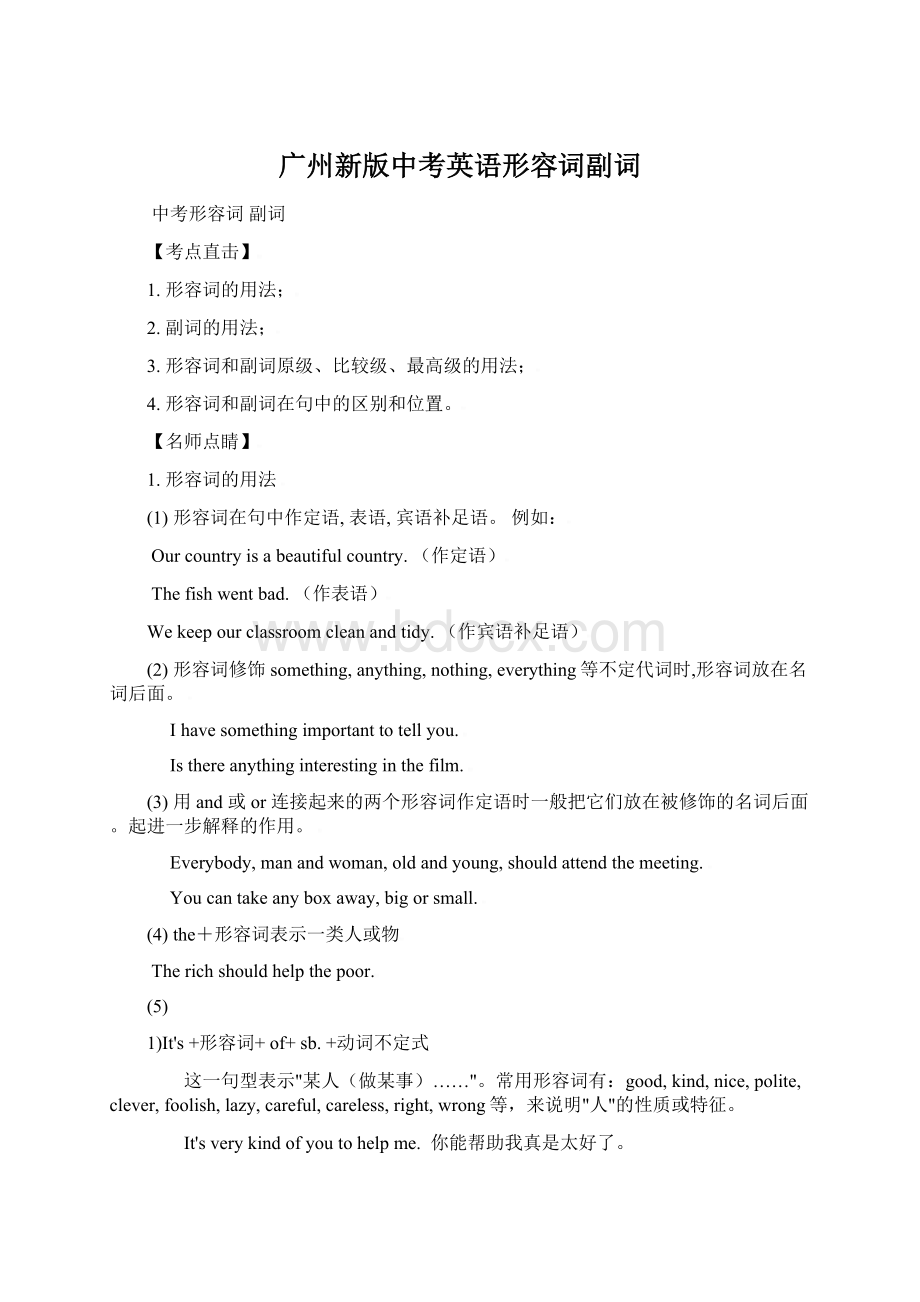广州新版中考英语形容词副词.docx
《广州新版中考英语形容词副词.docx》由会员分享,可在线阅读,更多相关《广州新版中考英语形容词副词.docx(10页珍藏版)》请在冰豆网上搜索。

广州新版中考英语形容词副词
中考形容词副词
【考点直击】
1.形容词的用法;
2.副词的用法;
3.形容词和副词原级、比较级、最高级的用法;
4.形容词和副词在句中的区别和位置。
【名师点睛】
1.形容词的用法
(1)形容词在句中作定语,表语,宾语补足语。
例如:
Ourcountryisabeautifulcountry.(作定语)
Thefishwentbad.(作表语)
Wekeepourclassroomcleanandtidy.(作宾语补足语)
(2)形容词修饰something,anything,nothing,everything等不定代词时,形容词放在名词后面。
Ihavesomethingimportanttotellyou.
Isthereanythinginterestinginthefilm.
(3)用and或or连接起来的两个形容词作定语时一般把它们放在被修饰的名词后面。
起进一步解释的作用。
Everybody,manandwoman,oldandyoung,shouldattendthemeeting.
Youcantakeanyboxaway,bigorsmall.
(4)the+形容词表示一类人或物
Therichshouldhelpthepoor.
(5)
1)It's+形容词+of+sb.+动词不定式
这一句型表示"某人(做某事)……"。
常用形容词有:
good,kind,nice,polite,clever,foolish,lazy,careful,careless,right,wrong等,来说明"人"的性质或特征。
It'sverykindofyoutohelpme. 你能帮助我真是太好了。
It'sfoolishofyoutomakesuchmistake. 你真傻啊,竟然犯这种错误。
2).It's+形容词+for+sb.+动词不定式
这一句型表示"做某事对某人来说……"。
常用形容词有:
difficult,easy,hard,dangerous,safe,useful,pleasant,interesting,impossible等,来说明动词不定式的性质、特征。
(6)部分以-ly结尾的词是副词。
但有些形容词也以-ly结尾:
friendly,
lovely,lonely,likely,lively,daily,weekly,monthly,yearly,early,silly等
2.副词的用法
(1)副词在句中可作状语,表语和定语。
Hestudiesveryhard.(作状语)
Lifehereisfullofjoy.(作定语)
Whenwillyoubeback?
(作表语)
副词按其用途和含义可分为下面五类:
1)时间副词
时间副词通常用来表示动作的时间。
常见的时间副词有:
nowtoday,tomorrow,yesterday,before,late,early,never,seldom,sometimes,often,usually,always等。
例如:
Heoftencomestoschoollate.
Whatarewegoingtodotomorrow?
HeisneverbeentoBeijing.
2)地点副词
地点副词通常用来表示动作发生的地点。
常见的地点副词有:
here,there,inside,outside,home,upstairs,downstairs,anywhere,everywhere,nowhere,somewhere,down,up,off,on,in,out等。
例如:
Imetanoldfriendofmineonmywayhome.
Hewentupstairs.
Putdownyournamehere.
3)方式副词
方式副词一般都是回答“怎样的?
”这类问题的,其中绝大部分都是由一个形容词加词尾-ly构成的,有少数方式副词不带词尾-ly,它们与形容词同形。
常见的方式副词有:
anxiously,badly,bravely,calmly,carefully,proudly,rapidly,suddenly,successfully,angrily,happily,slowly,warmly,well,fast,slow,quickly,hard,alone,high,straight,wide等。
例如:
Theoldmanwalkedhomeslowly.
Pleaselistentotheteachercarefully.
Thebirdsareflyinghigh.
Herunsveryfast.
4)程度副词
程度副词多数用来修饰形容词和副词,有少数用来修饰动词或介词短语。
常见的程度副词有:
much,(a)little,abit,very,so,too,enough,quite,rather,pretty,greatly,completely,nearly,almost,deeply,hardly,partly等。
例如:
Herpronunciationisverygood.
Shesingsquitewell.
Icanhardlyagreewithyou.
5)疑问副词是用来引导特殊疑问句的副词。
常见的疑问副词有:
how,when,where,why等。
例如:
Howareyougettingalongwithyourstudies?
Wherewereyouyesterday?
Whydidyoudothat?
(2)副词在句中的位置
1)多数副词作状语时放在动词之后。
如果动词带有宾语,则放在宾语之后。
例如:
MrSmithworksveryhard.
ShespeaksEnglishwell.
2)频度副词作状语时,通常放在行为动词之前,情态动词,助动词和be动词之后。
例如:
Heusuallygeatsupearly.
I’veneverheardhimsinging.
Sheisseldomill.
3)程度副词一般放在所修饰的形容词和副词的前面,但enough作副词用时,通常放在被修饰词的后面。
例如:
Itisaratherdifficultjob.
Herunsveryfast.
Hedidn’tworkhardenough.
4)副词作定语时,一般放在被修饰的名词之后。
例如:
Onmywayhome,Imetmyuncle.
Thestudentstherehavealottimetodotheirownresearchwork.
(3)部分常用副词的用法
1)very,much
这两个副词都可表示“很”,但用法不同。
Very用来修饰形容词和副词的原级,而much用来修饰形容词和副词的比较级。
例如:
Sheisaverynicegirl
I’mfeelingmuchbetternow.
Much可以修饰动词,而very则不能。
例如:
Idon’tliketheideamuch.
Theydidnottalkmuch.
2)too,either
这两个副词都表示“也”,但too用于肯定句,either用于否定句。
例如:
Shecandance,andIcandance,too.
Ihaven’treadthebookandmybrotherhasn’teither.
3)already,yet
already一般用于语肯定句,yet一般用于否定句。
例如:
Hehasalreadyleft.
Haveyouheardfromhimyet?
Hehasn’tansweredyet.
4)so,neither
so和neither都可用于倒装句,但so表示肯定,neither表示否定。
例如:
MybrotherlikesfootballandsodoI.
Mybrotherdoesn’tlikedancingandneitherdoI.
3.形容词和副词的比较级和最高级
(1)两个人或事物的比较时(不一定每一方只有一个人或一个事物),用比较
级。
Ourteacheristallerthanweare.
Theboysinherclassaretallerthantheboysinyourclass.
注意:
比较级的修饰语
Much(……得多),far(……得多),even(甚至,更),still(更),abit(有点),alittle(有点),alot(很),agreatdeal(大大地),twice(两倍),fivetimes(五倍),two-fifths(五分之二),ahalf(一半)等修饰比较级表示程度,但决不可用very修饰。
eg.TomisalittletallerthanMike. Tom比Mike稍高一点;
(2)most同形容词连用而不用the,表示"极,很,非常,十分"。
It'smostdangeroustobehere.
在这儿太危险。
(3)"The+形容词/副词比较级...,the+形容词/副词比较级..."表示"越...就越..."。
Themoreyoustudy,themoreyouknow.
(4)"形容词/副词比较级+and+形容词/副词比较级",表示"越来越..."。
It'sgettinghotterandhotter.
(5)主语+谓语+as+形容词/副词原形+as+从句。
表示两者对比相同。
Thisboxisasbigasmine.
(6)the+形容词表示某种人。
Healwayshelpsthepoor.
(7)形容词和副词最高级用于三个或三个以上的人和物进行比较。
ShanghaiisoneofthebiggestcitiesinChina.
注意:
最高级的修饰语
Byfar/farandaway 最,很 much……得多 almost几乎 nearly几乎
Thisis(by)farthebestbookthatI'veeverread. 这是我读过的最好的书。
4.例题分析
1.—Whichcityhas_________population,Beijing,GuangzhouorZhaoqing?
—Zhaoqing,ofcourse.
A.thelargestB.thesma